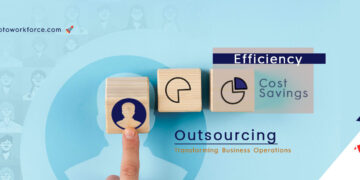Nothing is more critical to success than having the right people in the right roles. Talent acquisition, recruitment, and onboarding are the lifeblood of any thriving company. These processes are not just about hiring new workers. They’re about building a workforce that helps your business grow, encourages new ideas, and creates a culture of excellence.
Yet, the question remains: should you build this powerhouse team in-house, or is outsourcing the better route? As businesses grow and evolve, this decision becomes a pivotal point in determining future success. Each approach has its unique advantages, challenges, and impacts on your company’s culture and bottom line.
This article will show you how to choose between outsourcing and hiring in-house. It will focus on finding, recruiting, and training new employees. By the end, you’ll have the insights you need to make an informed decision tailored to your business needs.
Understanding Outsourcing: Unlocking Global Talent
Outsourcing is the practice of contracting external agencies, freelancers, or remote employees to handle specific business functions. This approach allows companies to use specialized skills and resources that might not be available internally.
Outsourcing can be done in many ways, including working with teams in faraway countries, working with teams in nearby countries, and working with local agencies.
In the context of talent acquisition, outsourcing often involves partnering with recruitment agencies or specialized firms that handle the entire hiring process—from identifying potential candidates to managing onboarding. This model is especially prevalent in industries that require rapid scaling, or that need access to niche skills that are hard to find locally.
When it comes to recruitment and onboarding, several functions are often outsourced. These include:
- Candidate sourcing
- Background checks
- Initial interviews
- Onboarding programs
By outsourcing these tasks, companies can free up internal resources to focus on strategic activities, such as culture-building and employee engagement.
Outsourcing recruitment also lets businesses use the knowledge of agencies that know about specific industries or jobs well. This can be particularly valuable for companies looking to fill highly specialized positions or expand into new markets.
One of the most significant benefits of outsourcing is access to a broader talent pool. By partnering with agencies or freelancers from around the world, companies can attract top talent without being limited by geographic boundaries. This is particularly advantageous for businesses in competitive industries where the demand for skilled workers often outstrips supply.
Cost-effectiveness is another compelling reason to consider outsourcing. By using the economies of scale offered by outsourcing agencies, companies can save money on hiring and training new employees.
Outsourcing also gives businesses the freedom to increase or decrease their recruitment efforts based on current needs. This means they don’t have to keep a large in-house team.
Speed is yet another advantage. Outsourcing agencies often have established processes and extensive networks that enable them to fill roles quickly. This can be a game-changer for businesses facing tight deadlines or needing to ramp up their workforce rapidly to meet project demands.
Understanding In-House Recruitment: The Power of Control
In-house recruitment refers to the practice of managing all aspects of talent acquisition within the company.
This involves building and maintaining a dedicated team responsible for sourcing, interviewing, and onboarding new employees. These teams usually work closely with other departments. They make sure that the hiring process matches the company’s goals and culture.
In-house recruitment allows companies to have full control over their hiring processes. This means they can change their hiring plans to fit their needs. They can make sure that new hires are qualified and a good match for the company’s culture.
Core Components of an In-House Talent Acquisition Team
An effective in-house talent acquisition team typically consists of several key components. Recruitment staff are at the top, doing the daily tasks of finding candidates, interviewing people, and managing the hiring process. These individuals often have a deep understanding of the company’s industry and specific talent needs.
Human resources (HR) involvement is another critical element. HR teams are important in making sure that hiring processes follow the law and match with the company’s larger HR plans. They also oversee onboarding, making sure that new hires are smoothly integrated into the company.
Employee referral programs are often a part of in-house recruitment strategies. These programs encourage current employees to refer good candidates from their friends. This can lead to good hires and make employees more involved.
Key Advantages of In-House Recruitment
One of the primary advantages of in-house recruitment is the ability to maintain full control over the hiring process.
Companies can make sure that every step, from choosing candidates to hiring new employees, fits with their specific needs and values. In-house recruitment teams can also be more flexible. They can change their plans quickly to meet the company’s needs or market conditions.
Another significant benefit is the deep alignment with company culture. In-house recruiters are often better able to assess cultural fit because they know the company’s values, mission, and working environment. This can lead to higher retention rates and a more cohesive workforce.
Enhanced collaboration between teams is also a notable advantage. In-house recruitment teams work closely with department leaders and other people involved. They make sure that the hiring process is closely linked to the company’s needs. This collaboration can result in more effective hiring decisions and a smoother onboarding process.
Comparing Talent Acquisition in Outsourcing vs. In-House: The Battle for the Best Talent
Here, we present you some ideas about how to decide between outsourcing talent acquisition of having an in-house team. Let’s take a closer look at them.
Speed and Efficiency: Time Is of the Essence
When it comes to speed and efficiency, outsourcing often has the upper hand. Outsourcing agencies have established networks and processes that allow them to identify and onboard talent quickly. This can be particularly beneficial in fast-paced industries where time is critical, and businesses need to fill roles rapidly to stay competitive.
In contrast, in-house recruitment may face challenges in terms of speed, especially if the internal team is limited in size or resources. However, the advantage of in-house recruitment is that it allows for a more thorough and deliberate hiring process, which can be crucial for roles that require a high level of expertise or cultural fit.
Ultimately, the choice between outsourcing and in-house recruitment will depend on your company’s priorities. If speed is paramount, outsourcing may be the better option. However, if quality and cultural alignment are more important, in-house recruitment might be the way to go.
Cost Considerations: Weighing the Short-Term vs. Long-Term Impact
Cost is a significant factor when deciding between outsourcing and in-house recruitment.
Outsourcing can be more cost-effective in the short term, especially for companies that do not have the resources to build and maintain a large in-house recruitment team. By outsourcing, businesses can avoid the fixed costs associated with hiring, training, and retaining recruitment staff.
However, in the long run, in-house recruitment can offer cost savings. Once an in-house team is established, the ongoing costs may be lower than the fees charged by outsourcing agencies. Additionally, in-house teams can provide a higher return on investment (ROI) by ensuring that new hires are a perfect fit for the company, leading to better performance and lower turnover rates.
In making this decision, it’s essential to conduct a thorough cost-benefit analysis that considers both short-term and long-term impacts. This will help you determine which approach offers the best value for your business.
Quality of Talent: Finding the Perfect Fit
The quality of talent is perhaps the most critical consideration when choosing between outsourcing and in-house recruitment.
Outsourcing offers access to a global talent pool, which can be particularly advantageous for businesses seeking specialized skills that are hard to find locally. This approach allows companies to tap into diverse perspectives and experiences, potentially leading to more innovative solutions.
However, in-house recruitment has the edge when it comes to cultural fit. In-house recruiters have a deep understanding of the company’s culture and values, enabling them to identify candidates who will not only excel in their roles but also contribute to a positive work environment. This can result in higher employee satisfaction and retention rates.
Both outsourcing and in-house recruitment have their strengths and weaknesses when it comes to talent quality. The right choice will depend on your company’s specific needs and priorities. If you require highly specialized skills, outsourcing might be the best option. On the other hand, if cultural fit is a top priority, in-house recruitment could be more effective.
Flexibility and Scalability: Adapting to Change
Flexibility and scalability are essential in today’s dynamic business environment. Outsourcing offers a high level of flexibility, allowing companies to scale their recruitment efforts up or down based on their current needs. This can be particularly beneficial for businesses with fluctuating demands or those undergoing rapid growth.
In contrast, in-house recruitment can be more challenging to scale quickly.
Building and expanding an internal team takes time and resources, which may not be feasible for businesses with urgent or unpredictable hiring needs. However, once established, an in-house team can provide a stable and consistent recruitment process that aligns closely with the company’s long-term goals.
The choice between outsourcing and in-house recruitment will depend on your company’s need for flexibility and scalability. If your business requires the ability to adapt quickly to changing conditions, outsourcing may be the better option. However, if you prioritize stability and consistency, an in-house approach might be more suitable.
Onboarding Process: A Critical First Impression
Onboarding is a critical step when it comes to outsourcing talent acquisition or keeping it as an in-house function. Let’s explore it now!
Outsourcing Onboarding: Standardization vs. Customization
When it comes to onboarding, outsourcing offers standardized practices that can be applied across various roles and industries. These practices are often based on best practices and industry standards, ensuring that new hires receive a consistent and efficient onboarding experience.
However, the downside of standardized onboarding is that it may not fully align with your company’s culture and values. This can lead to challenges in integrating new hires into the company’s culture, which may impact their long-term success and satisfaction.
On the other hand, in-house onboarding allows for a more customized approach. Internal teams can tailor the onboarding process to reflect the company’s unique culture, values, and goals. This can help new hires feel more connected to the company from day one, leading to better engagement and retention.
In-House Onboarding: Building Strong Foundations
In-house onboarding offers several advantages when it comes to building strong foundations for new employees. By customizing the onboarding process, companies can ensure that new hires receive the training and support they need to succeed in their roles. This can lead to higher levels of productivity and job satisfaction.
Additionally, in-house onboarding allows for direct involvement from internal teams, including managers and colleagues.
This can foster a sense of belonging and community, which is essential for employee engagement and retention. By involving internal teams in the onboarding process, companies can also ensure that new hires are aligned with the company’s goals and values from the start.
Ultimately, the choice between outsourcing and in-house onboarding will depend on your company’s priorities. If standardization and efficiency are your main concerns, outsourcing may be the better option. However, if you prioritize cultural alignment and employee engagement, in-house onboarding could be more effective.
The Long-Term Impact of Onboarding
Onboarding is a critical first impression that can have a lasting impact on a new hire’s experience and success. A well-executed onboarding process can set the stage for long-term employee engagement, productivity, and retention. Conversely, a poorly executed onboarding process can lead to disengagement, turnover, and lost productivity.
Whether you choose to outsource or manage onboarding in-house, it’s essential to prioritize this process and invest the necessary resources to ensure its success. By doing so, you can build a strong foundation for your new hires and set them up for long-term success within your company.
Decision-Making Factors: Choosing the Right Path for Your Business
Here are some decision factors that will help you choose the right model for you.
Company Size and Growth Stage: Tailoring Your Approach
One of the most important factors to consider when choosing between outsourcing and in-house recruitment is your company’s size and growth stage. Startups and small businesses may benefit from the flexibility and cost-effectiveness of outsourcing, which allows them to scale their recruitment efforts quickly without the need for a large in-house team.
In contrast, established businesses with more stable hiring needs may prefer the control and customization offered by in-house recruitment. As these companies grow, they can build and expand their internal recruitment teams to meet their evolving needs.
When making this decision, it’s essential to consider your company’s current and future needs. If you’re in a high-growth phase, outsourcing may offer the flexibility and scalability you need to keep pace with your business’s expansion. However, if you’re focused on building a strong, cohesive team, in-house recruitment may be more effective.
Budget Constraints and Cost-Benefit Analysis: Balancing Short-Term and Long-Term Costs
Budget constraints are another critical factor to consider when choosing between outsourcing and in-house recruitment. Outsourcing can be more cost-effective in the short term, as it allows businesses to avoid the fixed costs associated with building and maintaining an in-house team. However, it’s important to consider the long-term costs and benefits of each approach.
In-house recruitment may require a higher initial investment, but it can offer long-term cost savings by ensuring that new hires are a perfect fit for the company. This can lead to better performance, higher retention rates, and lower turnover costs.
When conducting a cost-benefit analysis, it’s essential to consider both short-term and long-term costs, as well as the potential return on investment (ROI) of each approach. This will help you determine which option offers the best value for your business.
Company Culture and Core Values: The Importance of Cultural Alignment
Company culture and core values play a crucial role in the success of your recruitment and onboarding efforts. In-house recruitment offers the advantage of deep alignment with company culture, as internal recruiters have a firsthand understanding of the company’s values and mission. This can lead to better cultural fit and higher employee satisfaction.
Outsourcing, on the other hand, may pose challenges in terms of cultural alignment. While outsourcing agencies can provide access to a global talent pool, they may not fully understand your company’s unique culture and values. This can lead to challenges in integrating new hires into your company’s culture.
When making this decision, it’s important to consider the impact of each approach on your company’s culture and values. If cultural alignment is a top priority, in-house recruitment may be the better option. However, if you require specialized skills that are hard to find locally, outsourcing may offer the best solution.
Specific Talent Needs: Finding the Right Fit for Your Business
Finally, it’s essential to consider your company’s specific talent needs when choosing between outsourcing and in-house recruitment. If your business requires highly specialized skills that are hard to find locally, outsourcing may offer access to a broader talent pool and a more efficient recruitment process.
In contrast, if your company’s talent needs are more general, in-house recruitment may offer the advantage of a more tailored and customized approach. By building an in-house team, you can ensure that new hires are aligned with your company’s culture and values, leading to better long-term outcomes.
When making this decision, it’s important to consider the impact of each approach on your business’s talent needs and long-term goals. By doing so, you can choose the approach that offers the best fit for your company’s unique requirements.
Making the Right Choice for Your Business
In conclusion, the decision between outsourcing and in-house recruitment is not one-size-fits-all. Both approaches offer unique advantages and challenges, and the right choice will depend on your company’s specific needs, priorities, and long-term goals.
Whether you choose to outsource or manage recruitment and onboarding in-house, it’s essential to prioritize these processes and invest the necessary resources to ensure their success. By doing so, you can build a strong, cohesive team that drives your business forward and helps you achieve your goals.
As you evaluate your current recruitment strategy and consider your options, remember that the key to success is finding the right balance between cost, quality, speed, and cultural alignment. By making an informed decision, you can choose the approach that best meets your business’s needs and sets you up for long-term success.














